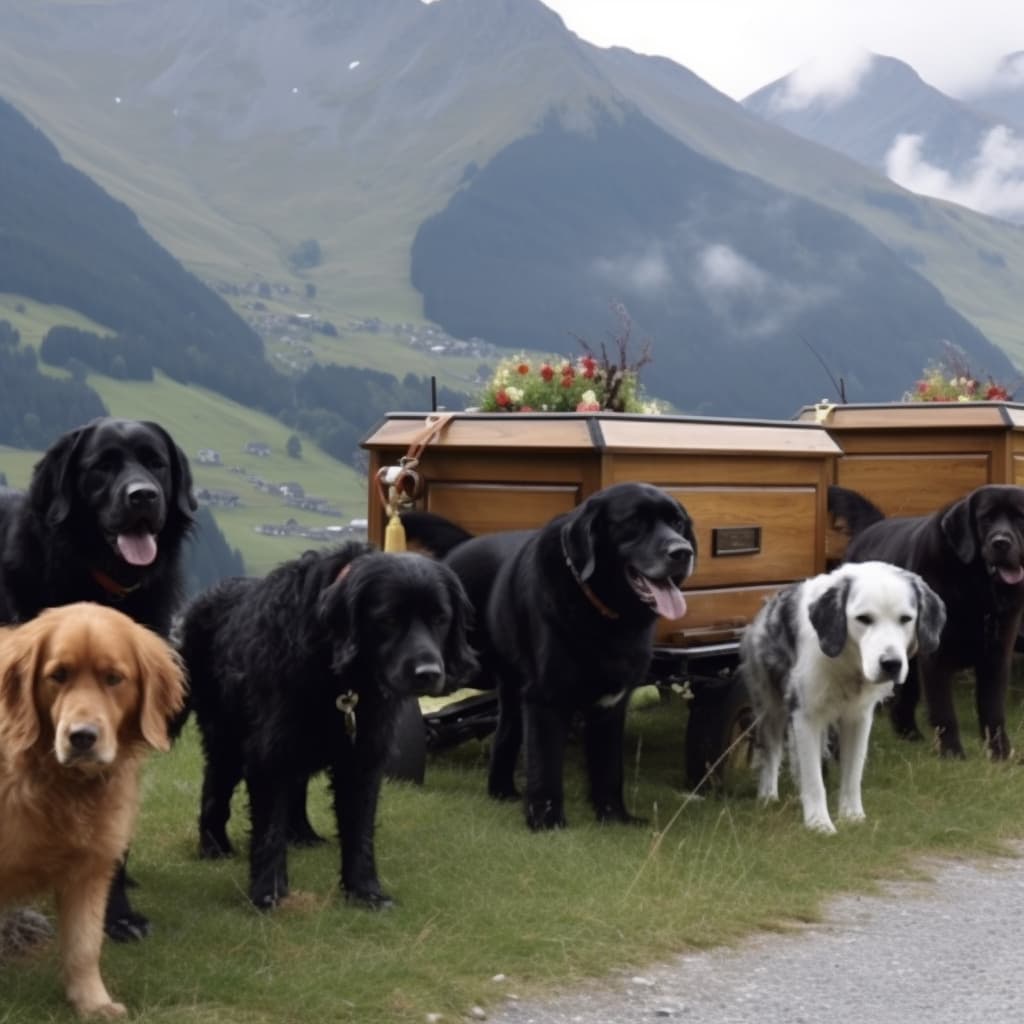AI generated content
This content is generated by an AI and does not reflect the opinions or views of individuals, either living or deceased.
| Text generated by | ChatGPT (GPT-4) |
| Text prompt | Find a little known fact about people from Switzerland, and write an article about it. |
| Image generated by | Midjourney |
| Image prompt | The Curious Case of the Swiss Canine Funerals in Switzerland |
The Curious Case of the Swiss Canine Funerals: A Little-Known Swiss Tradition

Introduction
When it comes to Switzerland, most people think of picturesque landscapes, delicious chocolate, and high-quality watches. However, this beautiful Alpine nation is also home to a myriad of fascinating traditions and customs that are lesser-known to the outside world. One such intriguing and lesser-known fact about the Swiss is their unique practice of organizing funerals for their beloved canine companions. In this article, we will delve into this heartwarming Swiss tradition and explore its origins, practices, and significance.
Historical Roots
The tradition of holding funerals for dogs in Switzerland can be traced back to the early 19th century. Switzerland has always had a strong connection with dogs, particularly the St. Bernard breed, which has been used for centuries as a rescue dog in the treacherous snowy mountains of the Alps. The bonds forged between the Swiss and their canine companions led to the unique practice of honoring their loyal pets with funeral ceremonies.
This custom was initially limited to the rural areas of Switzerland, but as the nation urbanized and became more affluent, the tradition spread to the cities as well. Today, Swiss families from all walks of life are known to honor their deceased pets with heartwarming funeral ceremonies.
The Funeral Ceremonies
The Swiss approach to canine funerals is deeply rooted in their culture and varies from one canton to another. However, some common elements can be observed in these ceremonies. The pet's body is typically cleaned and prepared by the owner or a professional pet mortician. They may choose to dress the pet in a favorite outfit, blanket, or other sentimental items.
The funeral ceremony may be held at the family's home, a pet cemetery, or a designated pet funeral home. Family and friends gather to pay their respects, and a eulogy is often delivered, recounting the special memories shared between the deceased pet and its human family members. Prayers or poems may also be recited during the ceremony, depending on the family's religious or spiritual beliefs.
In some cantons, it is customary for the owner to plant a tree or a flower in memory of their pet, symbolizing the continued growth and life that their canine companion brought to their lives. The pet's remains may be buried in a special pet cemetery or cremated, with the ashes either kept in an urn or scattered in a meaningful location.
The Significance of the Tradition
The Swiss tradition of honoring their deceased canine companions with funerals highlights the strong emotional bond between humans and their pets. By giving their beloved pets a proper send-off, the Swiss acknowledge the profound impact that these animals have on their lives, providing love, companionship, and support.
This practice also serves as a form of closure for the grieving pet owners, allowing them to come to terms with their loss and celebrate the life of their cherished pets. In a society where pets are increasingly regarded as family members, the Swiss tradition of canine funerals emphasizes the importance of acknowledging and honoring the depth of our connections with our animal companions.
Conclusion
The unique Swiss tradition of holding funerals for dogs showcases the deep-rooted love and respect that the Swiss have for their pets. This heartwarming custom not only helps pet owners to cope with the loss of their beloved companions but also highlights the significant role pets play in our lives. As a little-known fact about the Swiss, this tradition provides a fascinating glimpse into the values and beliefs that shape their culture, revealing a nation that cherishes and honors the bond between humans and animals.
